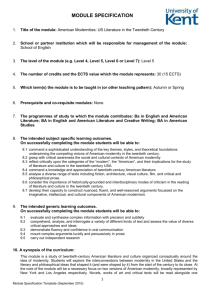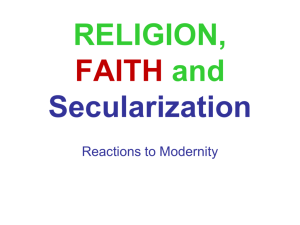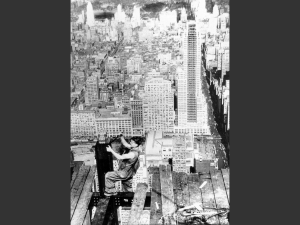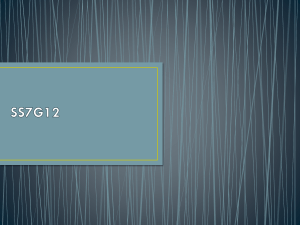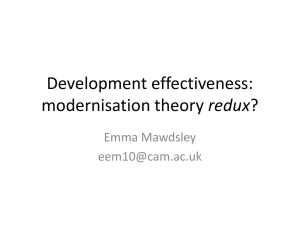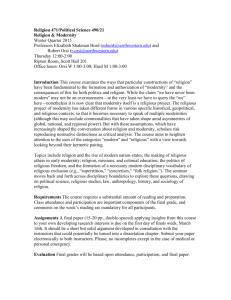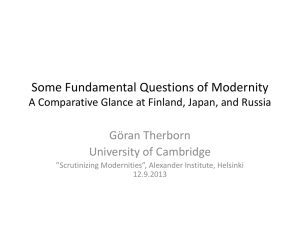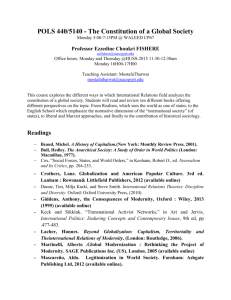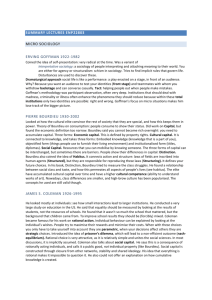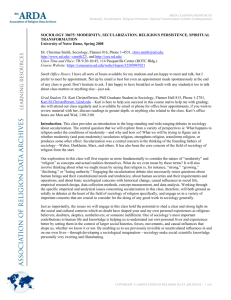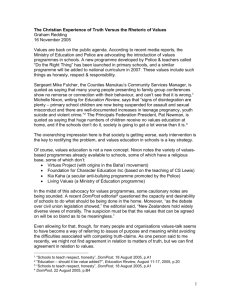Religion and Modernity - Central European University
advertisement
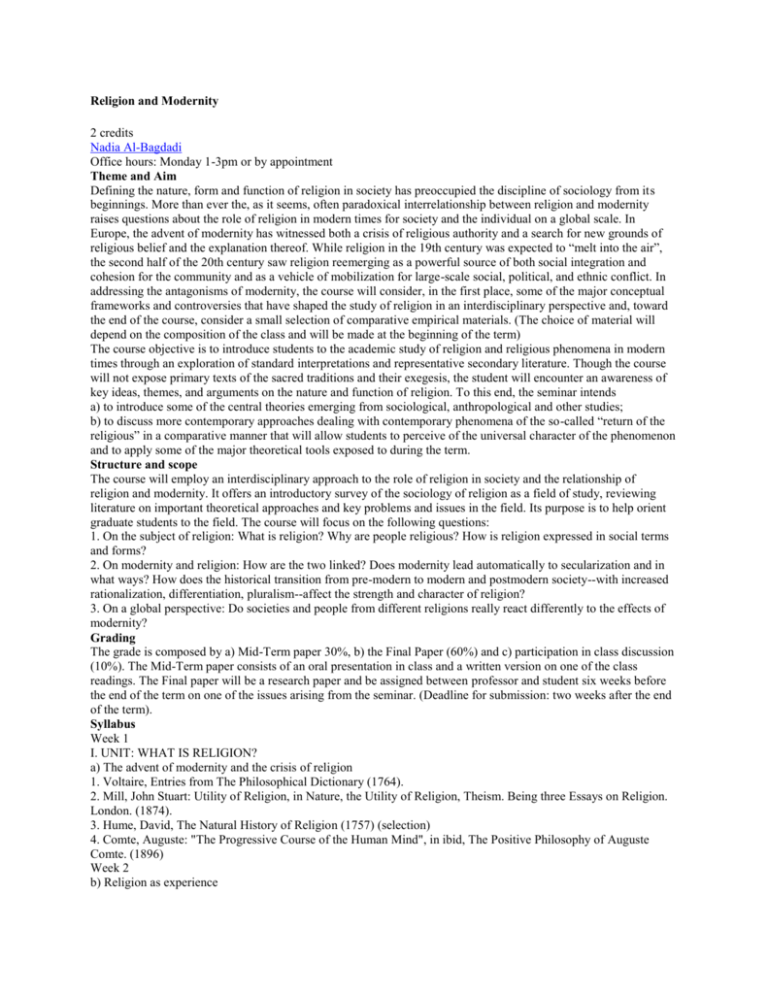
Religion and Modernity 2 credits Nadia Al-Bagdadi Office hours: Monday 1-3pm or by appointment Theme and Aim Defining the nature, form and function of religion in society has preoccupied the discipline of sociology from its beginnings. More than ever the, as it seems, often paradoxical interrelationship between religion and modernity raises questions about the role of religion in modern times for society and the individual on a global scale. In Europe, the advent of modernity has witnessed both a crisis of religious authority and a search for new grounds of religious belief and the explanation thereof. While religion in the 19th century was expected to “melt into the air”, the second half of the 20th century saw religion reemerging as a powerful source of both social integration and cohesion for the community and as a vehicle of mobilization for large-scale social, political, and ethnic conflict. In addressing the antagonisms of modernity, the course will consider, in the first place, some of the major conceptual frameworks and controversies that have shaped the study of religion in an interdisciplinary perspective and, toward the end of the course, consider a small selection of comparative empirical materials. (The choice of material will depend on the composition of the class and will be made at the beginning of the term) The course objective is to introduce students to the academic study of religion and religious phenomena in modern times through an exploration of standard interpretations and representative secondary literature. Though the course will not expose primary texts of the sacred traditions and their exegesis, the student will encounter an awareness of key ideas, themes, and arguments on the nature and function of religion. To this end, the seminar intends a) to introduce some of the central theories emerging from sociological, anthropological and other studies; b) to discuss more contemporary approaches dealing with contemporary phenomena of the so-called “return of the religious” in a comparative manner that will allow students to perceive of the universal character of the phenomenon and to apply some of the major theoretical tools exposed to during the term. Structure and scope The course will employ an interdisciplinary approach to the role of religion in society and the relationship of religion and modernity. It offers an introductory survey of the sociology of religion as a field of study, reviewing literature on important theoretical approaches and key problems and issues in the field. Its purpose is to help orient graduate students to the field. The course will focus on the following questions: 1. On the subject of religion: What is religion? Why are people religious? How is religion expressed in social terms and forms? 2. On modernity and religion: How are the two linked? Does modernity lead automatically to secularization and in what ways? How does the historical transition from pre-modern to modern and postmodern society--with increased rationalization, differentiation, pluralism--affect the strength and character of religion? 3. On a global perspective: Do societies and people from different religions really react differently to the effects of modernity? Grading The grade is composed by a) Mid-Term paper 30%, b) the Final Paper (60%) and c) participation in class discussion (10%). The Mid-Term paper consists of an oral presentation in class and a written version on one of the class readings. The Final paper will be a research paper and be assigned between professor and student six weeks before the end of the term on one of the issues arising from the seminar. (Deadline for submission: two weeks after the end of the term). Syllabus Week 1 I. UNIT: WHAT IS RELIGION? a) The advent of modernity and the crisis of religion 1. Voltaire, Entries from The Philosophical Dictionary (1764). 2. Mill, John Stuart: Utility of Religion, in Nature, the Utility of Religion, Theism. Being three Essays on Religion. London. (1874). 3. Hume, David, The Natural History of Religion (1757) (selection) 4. Comte, Auguste: "The Progressive Course of the Human Mind", in ibid, The Positive Philosophy of Auguste Comte. (1896) Week 2 b) Religion as experience 5. Tylor, Edward B. 1873: “Animism”, in ibid, Primitive Culture (2 vols). London (=chap.11). 6. Otto, Rudolph 1952(2nd ed): The Idea of the Holy. An Inquiry into the Non-rational Factor in the Idea of the Divine and its Relation to the Rational. (selection) 7. Eliade, Mircea 1957/1987: The Sacred and the Profane. The Nature of Religion. San Diego, New York, London. (selection). 8. Caillois, Roger 1959/2000: Man and the Sacred (chap. 1: "General Interrelationship of the Sacred and the Profane" and chap. 2: "The Ambiguity of the Sacred", pp. 19-32 and 33-59). Week 3 II. UNIT: APPROACHES TO THE STUDY OF RELIGION AND SOCIETY a) The Sociological Tradition: Substantive approaches 9. Durkheim, Emile 1912/1995, The Elementary Forms of Religious Life. New York (chap.1-3). Week 4 10. Weber, Max 1922: “The Sociology of Religion”, in Economy and Society, (chap.5). 11. Simmel, Georg 1997: “Religion and Modernity”, in ibid. Essays on Religion. Ed. and transl. by Horst Jürgen Helle, New Haven, London (=Part 1), pp. 3-28. Week 5 b) The functional approach 12. Luckmann, Thomas 1967, Invisible Religion. The Problem of Religion in modern Society. New York, London Week 6 c) Anthropological approaches: Religion as meaning 13. Geertz, Clifford 1973: “Religion as a Cultural System”, in ibid, The Interpretation of Cultures. New York. 14. Douglas, Mary, Purity and Danger. (selection) Week 7 d) Psychologies of Religion 15. Freud, Sigmund 1927/1961: The Future of an Illusion. Vol. 11, Standard Edition. London (selection) 16. 1939/1964: Moses and Monotheism. Vol. 23 Standard Edition, London (selection). Week 8 III. UNIT: RETURN OF THE SACRED? a) The debate on secularization versus sacralization 17. Wilson, Bryan 1982: “Secularization and its Discontents” (=chap. 6), in ibid, Religion in Sociological Perspective, Oxford, NY, pp. 148-80. 18. Hammond, Philipp E. and Mark A. Shibly 1993: “When the Sacred returns: An Empirical Test”, in Secularization, Rationalism and sectarianism. Essays in Honour of Bryan R. Wilson, Eds. Eileen Barker et.al, Oxford, pp. 37-46. Week 9 19. Berger, Peter L. (ed.) 2000: The De-Secularisation of the World. Essays on the Resurgence of Religion in World Politics. Washington. (selection) 20. Casanova, José 1992: Public Religions in the Modern World. Chicago, London, pp. 40-74. (=Chap. 2 “Private and Public Religions”. Week 10 21. Eisenstadt, S.N. 2003: "The Reconstruction of Religious Arenas in the Framework of ‘Multiple Modernities’", in Islam: Critical Concepts in Sociology. ed. by Bryan S. Turner (vol. 4: Islam and Social Movements. London, New York, pp. 1-22. Week 11 b) Religious Fundamentalism and Modern Society 22. Bryan S. Turner 2003: "Politics and Culture in Islamic Globalism", in, Islam: Critical Concepts in Sociology, ed. by Bryan S. Turner (vol. 4: Islam and Social Movements. London, NY, pp. 84-101. 23. Case studies from The Fundamentalism Project eds. Martin Marty et al, 5 vols. (depending on class’ interest and foreknowledge) Week 12 c) Final discussion: Religion and Modernity – new approaches? 24. Sharot, Stephen 2001: A Comparative Sociology of World Religions. Virtuosi, Priests, and Popular Religion. NY, London (selection).

